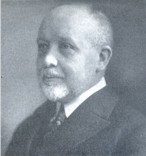Peder Pedersen
- Birthdate
- 1874/06/19
- Birthplace
- Sig, Denmark
- Death date
- 1941
- Fields of study
- Telegraphy, Telephony, Radio
- Awards
- Gold Medal of the Royal Danish Society of Sciences of Copenhagen, IRE Medal of Honor
Biography
Peder Oluf Pedersen was born in Sig, Denmark, 19 June 1874, the only son of a farmer. He attended the village school and in 1889 sent to the King of Denmark proposals for a perpetual motion device and a calculating machine. These so interested the King in his further education that he was transferred to Copenhagen where, after the necessary preparatory education, he entered the Royal Technical College, graduating with honor in civil engineering in 1897. The expense of his studies was contributed to by the King.
Pedersen soon became interested in electrical research work and in 1899 became associated with Valdemar Poulsen in his development work on the telegraphone. He later aided in the same inventor's development of the system for continuous wave wireless telegraphy and telephony which has become known as the Poulsen Arc.
In 1909, Pedersen was appointed Assistant Professor in Telegraphy, Telephony and Radio at the Royal Technical College at Copenhagen, becoming Professor in 1912. In 1922, he was appointed principal of this college.
Pedersen contributed a great number of papers on scientific matters in electrophysics and electrotechnics, mainly on experimental researches carried out by himself. He received his Ph.D. at the University of Copenhagen in 1929.
Pedersen was a member of the Royal Danish Society of Sciences, the Royal Academy of Natural Sciences (Lund, Sweden), the Academy of Engineering Sciences (Stockholm), and the Royal Society of Sciences (Trondhjem, Norway). In 1911-1912 Professor Pedersen was Chairman of the Danish Physical Society. In 1916-1920 he was President of the Danish Society of Electricians, and in 1920 he became President of the State Control board for Licensed Telephone Companies of Denmark. From 1920 to 1923 he was President of the Society of Danish Civil Engineers. He was keenly interested in standardization work and in 1926 was elected President of the Danish Section of the International Electrotechnical Commission. He was a Fellow of the American Institute of Electrical Engineers, and a Member of the Institution of Electrical Engineers (Great Britain). He became a Fellow of the Institute of Radio Engineers in 1915.
In 1907, Pedersen was awarded the Gold Medal of the Royal Danish Society of Sciences of Copenhagen, for a paper on an experimental investigation of the oscillations in liquid jets. He was awarded the H. C. Oersted Medal in 1927, and the IRE Medal of Honor in 1930. He passed away in 1941.
